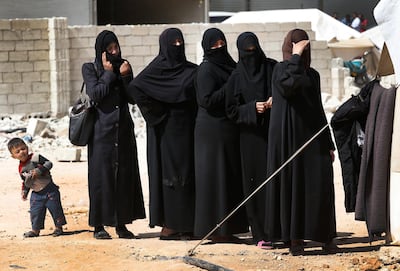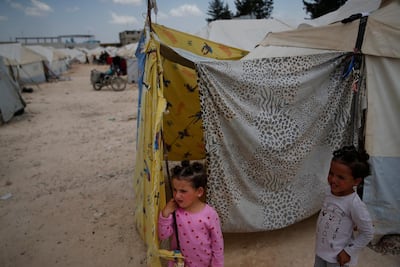As the rising sun hits the endless rows of tents every morning, the residents of Deir Ballout camp are also forced to rise.
“The tent becomes hot as fire and wakes me and my wife and children,” says Abu Wissam, a Palestinian refugee originally from south Damascus. “I drink my coffee while trying to calm down the neighbours, who are always yelling and screaming at each other because of how bad the situation is, before my wife starts to ask where I will find food for breakfast.”
For the several thousand inhabitants of this tent city in the hills of northern Syria that under the control of Turkish-backed forces, the civil war’s front lines may now be distant but their new reality is scarcely an improvement.
Last month, the Syrian government and its Russian allies imposed ‘reconciliation’ and deportation agreements on the last remaining rebel-held pockets of Damascus and Homs. Beginning in early May, some 9,250 people were bussed nearly 400 kilometres north from the south Damascus suburbs, according to a humanitarian monitor that records arrivals in Syria's north. Another 35,000 have also been displaced from northern Homs in recent months.
Life has been bitter in the north for the thousands of rebel fighters and their families, and the Syrian and Palestinian civilians unwilling to remain in neighbourhoods back under Syrian government control.
______________
Read more
Deadly clashes as extremists attack besieged Syria regime villages
Rare tensions between Assad's backers as Syria's war unwinds
ISIS loses territory in Syria town after major suicide attack
______________
Residents say the living conditions in the Turkish-serviced camp are so bad that people are dying from preventable diseases as infections spread through the population.
“People knew the situation was going to be bad—they understood what it means to live in a tent—but not like this,” said Abu Imad, a relief activist originally from Yarmouk. “There is a lack of proper food supplies, water and medical services.”
Doctors are currently fighting an outbreak of diarrhoea caused by unclean drinking water and a searing heat wave. In the past week, at least 150 patients have been treated for dysentery and dehydration.
A water tank delivered each morning is never enough, residents say.
For other supplies, residents travel to the nearest town Jandaris, several kilometres to the north. The distance is too far to walk in the summer heat but the cost of transportation is too much for many of the working-class Syrian and Palestinian families, many of whom arrived with scarcely any money. “The main challenge is finding a ride to the market,” said Abu Wissam. “You might go with 1,500 Syrian pounds [Dh10] for food but you spend some of that getting a car there.”

With no other jobs available, newly displaced rebel fighters who say they’d planned to lay down their weapons are instead joining local armed groups for income to support their families.
Turkish state-run aid agency AFAD manages the camp, as it falls within areas recently controlled by the Turkish government. In April, Turkish-backed rebel forces drove Kurdish forces from the area. Today other aid organisations are forbidden from operating in the camp, which activists and doctors inside Deir Ballout say is exacerbating the already poor conditions.
An AFAD spokesperson did not respond to requests for comment.
The ability or willingness of the Turkish government to manage the incoming displaced was already called into question last month, after several thousand evacuees from south Damascus and the Homs countryside were stranded at a checkpoint near the northern city of Al-Bab, apparently due to poor coordination between the Turkish government and those negotiating ‘reconciliation’ in their respective area.
Those experiences in transit as well as reports of the awaiting conditions hasn’t stopped others from Damascus and Homs coming north. “Even though many others tried to tell people that the situation was going to be hard, the migrants kept talking about coming north because they feared for their lives [back home],” said activist Abu Imad.

Many left out of fear reprisals, even if they themselves hadn’t taken up arms against the government. “My brother is detained, there was no way for me to stay,” said Abu Wissam. “I couldn’t shake hands with the regime after all that’s happened.”
Around 17,000 people originally registered to leave south Damascus but about half that ended up making the journey, sources said.
Many appeared unwilling to head to rebel-held Idlib, which is still regularly subjected to government and Russian air-strikes.
For many living in the camp, planning their escape has become a priority. Conversations frequently turn to the possibility of getting smuggled into Turkey. Last week, Palestinian residents held a small demonstration inside the camp demanding either their “right of return to Palestine or migration [elsewhere].”
Smoking cigarettes after breaking his Ramadan fast, Abu Wissam was still unsure about the decision to come to the camp. “If it was just me here, I’d prefer to die than live like this.”
Hamada Hameed contributed reporting from northern Syria

